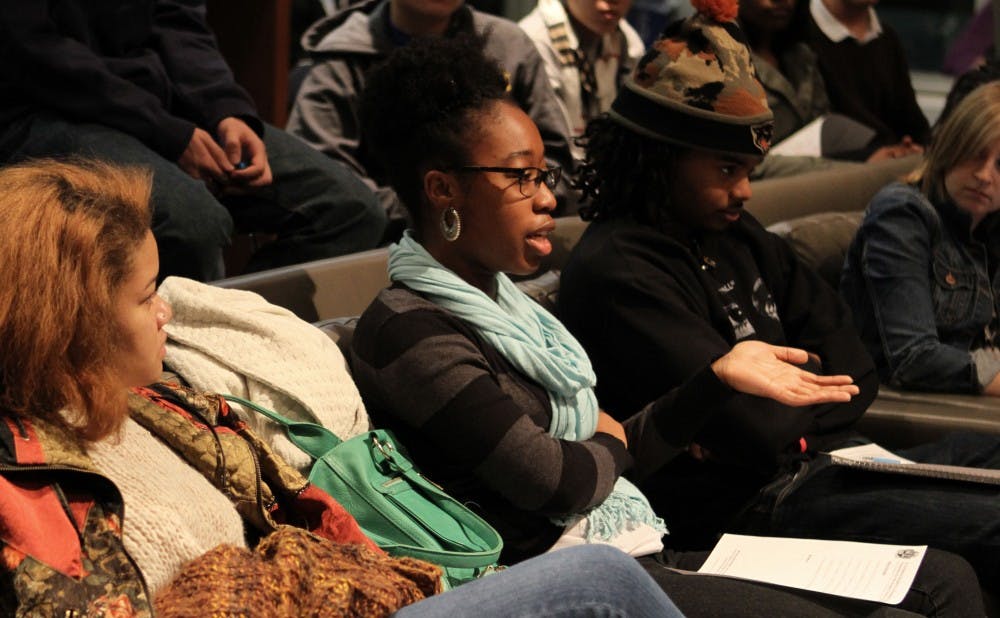Students in North Carolina took steps to understand the implications of the North Carolina voting reform law, passed this summer, at a forum Monday night.
Students have voiced their concern on campus over the state’s election reform law, signed by Governor Pat McCrory on Aug. 12, regarding how college students' ability to vote may be affected. About 60 members from both the Duke and University of North Carolina at Chapel Hill communities continued the conversation in the Keohane Atrium to hear from experts on the issue and discuss the implications of the law amongst themselves. The forum, called “A Voteless People is a Hopeless People,” was sponsored by the Alpha Phi Alpha fraternity.
“College students are the enemy for people who want to restrict voting,” said Timothy Tyson, visiting professor of American Christianity and southern culture and education chair for the N.C. National Association for the Advancement of Colored People.
Tyson outlined the history of the achievement of equal voting rights and public education. Many major steps were taken in North Carolina, such as the tripling of African-American voter registration in 1946, he said. By 1960, 40 percent of African-Americans were registered to vote in the state—a higher rate than most of the South at that time, he said.
He went on to address the recent sweeping voting reforms that have garnered attention from college students and minorities who will be affected by it.
Tyson cited the ongoing NAACP-sponsored Moral Monday movement to present bipartisan opposition to the state legislature’s actions and the efforts of Montravius King to prove college students’ rights to vote as signs of the contentious reaction to the law and the subsequent productive response by its opponents.
“This is not grandmama’s NAACP," Tyson said. "We scare the mess out of them right and left. We’ve got a grassroots movement going on here, and it’s big."
Duke Democrats President Diego Quezada, a junior, addressed the crowd to explain and educate on the contents of the voter identification law. These provisions include the requirement of a government-issued photo ID to register to vote, a seven-day cut in early voting and the elimination of same-day registration, out-of-precinct voting and pre-registration by 16- and 17-year olds. The reduction of the early voting window will likely eliminate Duke’s ability to host and receive funding for its on-campus early voting site.
All of the provisions will take effect in 2014 before the midterm elections, except for the photo identification provision, which will become law in 2016.
“This isn’t just a voter ID bill,” Quezada said to the audience. “That’s part of it, but it’s not the only thing.”
After Quezada spoke, the floor was opened up for a discussion moderated by Marcus Benning, president of the Black Student Alliance, and a member of Alpha Phi Alpha. Benning presented a question from a member of the UNC NAACP, asking if it was a valid argument that since flying on a plane and purchasing alcohol require photo ID, voting should also necessitate .
“The right to vote is a right every person should have,” sophomore Ernie Britt said. “To have that obstacle put on you where that should be a right makes the whole situation difficult.”
Students also brought up immigration laws that, like the voter identification law, have been criticized for infringing on minorities' rights.
“Duke has openly supported the DREAM Act [on immigration reform], but words are one thing and policies are another,” said Adam Rodriguez, a senior and member of student Latino association Mi Gente. “Next semester, do a campaign where we get the undocumented voices that exist all around this country.”
Co-sponsors of the event included both the Duke and UNC chapters of the NAACP, Mi Gente, the Asian Students Association, Duke Democrats, the Duke Women’s Center, Duke College Republicans and Students for a Democratic Society.
“These are really issues that reflect a wide cross-section of people and our co-sponsors reflect that,” Benning said.
Tyson called on young people to act as the core of the movement and emphasized the critical role young people will play in promoting voting rights.
“It’s really your world…. It’s broke and we don’t know how to fix it and we want you to fix it,” Tyson said. “Sorry.”
Get The Chronicle straight to your inbox
Signup for our weekly newsletter. Cancel at any time.

